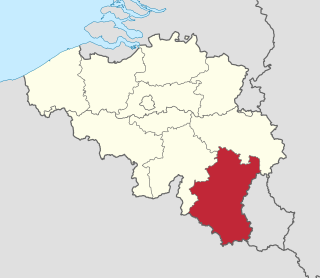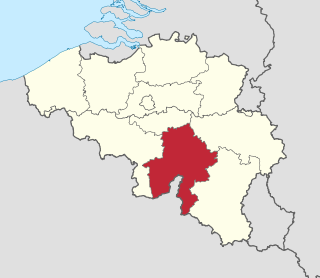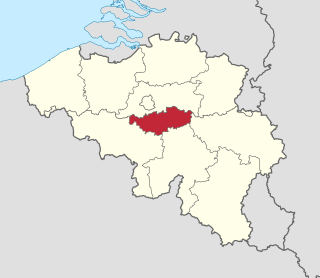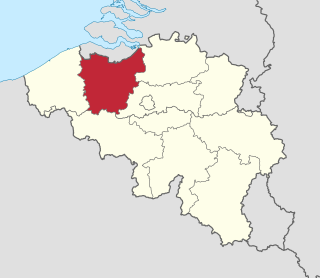
The country of Belgium is divided into three regions. Two of these regions, Flanders and Wallonia, are each subdivided into five provinces. The third region, Brussels, is not divided into provinces, as it was originally only a small part of a province itself.

DéFI is a social-liberal, liberal, regionalist political party in Belgium mainly known for defending French-speakers’ interests in and near the Brussels region. The party is led by François de Smet, a member of the Chamber of Representatives. The party's current name, DéFI or Défi, was adopted in 2016 and is a backronym of Démocrate, Fédéraliste, Indépendant meaning "challenge" in French.

The Belgian Federal Parliament is the bicameral parliament of Belgium. It consists of the Chamber of Representatives and the Senate. It sits in the Palace of the Nation. The Chamber of Representatives is the primary legislative body; the Senate functions only as a meeting place of the federal communities and regions.

The Senate is one of the two chambers of the bicameral Federal Parliament of Belgium, the other being the House of Representatives. It is considered to be the "upper house" of the Federal Parliament. Created in 1831 as a chamber fully equal to the Chamber of Representatives, it has undergone several reforms in the past, most notably in 1993 and 2014. The 2014 elections were the first without a direct election of senators. Instead, the new Senate is composed of members of community and regional parliaments and co-opted members. It is a chamber of the communities and regions and serves as a platform for discussion and reflection about matters between these federated entities. The Senate today plays a minor role in the federal legislative process. However, the Senate, together with the Chamber, has full competence for the Constitution and legislation on the organization and functioning of the Federal State and the federated entities. Since the reform of 2014, it holds about ten plenary sessions a year.

The area within Belgium known as Brussels-Halle-Vilvoorde encompasses the bilingual—French and Dutch—Brussels-Capital Region, which coincides with the arrondissement of Brussels-Capital and the surrounding Dutch-speaking area of Halle-Vilvoorde, which in turn coincides with the arrondissement of Halle-Vilvoorde. Halle-Vilvoorde contains several municipalities with language facilities, i.e. municipalities where French-speaking people form a considerable part of the population and therefore have special language rights. This area forms the judicial arrondissement of Brussels, which is the location of a tribunal of first instance, enterprise tribunal and a labour tribunal. It was reformed in July 2012, as part of the sixth Belgian state reform.
Arrondissements of Belgium are subdivisions below the provinces of Belgium. There are administrative, judicial and electoral arrondissements. These may or may not relate to identical geographical areas.

Geert Albert Bourgeois is a Belgian politician of the New Flemish Alliance (N-VA), which he founded in 2001, who is currently serving as a Member of the European Parliament since 2019. He previously served as the Minister-President of Flanders from 2014 to 2019. Prior to this, he was a member of the federal Chamber of Representatives for the People's Union from 1995 to 2001, and then for the N-VA from 2001 to 2004. He has been involved in local and regional politics in Flanders since 1976.
Federal elections were held in Belgium on 25 May 2014. All 150 members of the Chamber of Representatives were elected, whereas the Senate was no longer directly elected following the 2011–2012 state reform. These were the first elections held under King Philippe's reign.

Federal elections were held in Belgium on 26 May 2019, alongside the country's European and regional elections. All 150 members of the Chamber of Representatives were elected from eleven multi-member constituencies.

Luxembourg is a parliamentary constituency in Belgium used to elect members of the Chamber of Representatives since 2003. It corresponds to the province of Luxembourg.

Namur is a parliamentary constituency in Belgium used to elect members of the Chamber of Representatives since 2003. It corresponds to the province of Namur.

Walloon Brabant is a parliamentary constituency in Belgium used to elect members of the Chamber of Representatives since 2003. It corresponds to the province of Walloon Brabant.

Liège is a parliamentary constituency in Belgium used to elect members of the Chamber of Representatives since 1831. It corresponds to the province of Liège.

Hainaut is a parliamentary constituency in Belgium used to elect members of the Chamber of Representatives since 2003. It corresponds to the province of Hainaut.

The administrative arrondissement of Brussels-Capital, which corresponds to the Brussels-Capital Region, serves as a parliamentary constituency in Belgium for the election of the Chamber of Representatives since 2014.

West Flanders is a parliamentary constituency in Belgium used to elect members of the Chamber of Representatives since 2003. It corresponds to the province of West Flanders.

Limburg is a parliamentary constituency in Belgium used to elect members of the Chamber of Representatives since 2003. It corresponds to the province of Limburg.

East Flanders is a parliamentary constituency in Belgium used to elect members of the Chamber of Representatives since 2003. It corresponds to the province of East Flanders.

Antwerp is a parliamentary constituency in Belgium used to elect members of the Chamber of Representatives since 2003. It corresponds to the province of Antwerp.
Constituencies are used for elections in Belgium.

















